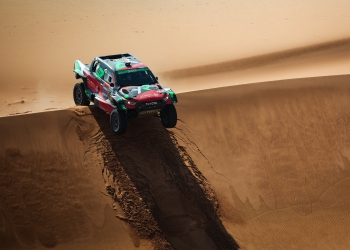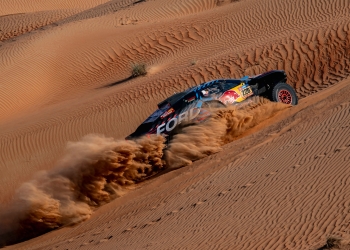Stage three is the first part of a mini-marathon from Al Duwadimi to Al Salamiya with 732km of driving. The kicker is that service time, immediately after the finish, is limited to just two hours before the cars head off to a remote parc ferme where the crews will sleep in tents in the desert.
Do you go hard and fast, or pace yourself?
For the stage four winner, Lucas Moraes/Armand Monleon it was a bit of both. From a starting position of ninth, the Brazilian Toyota Gazoo Racing driver kept a watching brief of those ahead, staying within two minutes of the leaders. He briefly took the lead at km 310 before dropping to second – by only four seconds – to a hard-charging Nasser Al-Attiyah/Mathieu Baumel in their Prodrive Hunter.
Moraes kept the car hard on the power staying 22 seconds behind the Qatari, and over the last 33km of the stage, made a late charge, beating not only Al-Attiyah, but also Mattias Ekström/Emil Bergkvist’s Audi by nine seconds, and Yazeed Al Rajhi by one minute, all three ending ahead of Al-Attiyah. It was Moraes first Dakar stage win.
Second in the stage after a magnificent drive was Audi’s Ekström/Bergkvist duo which was enough to elevate the Swedes into third overall.
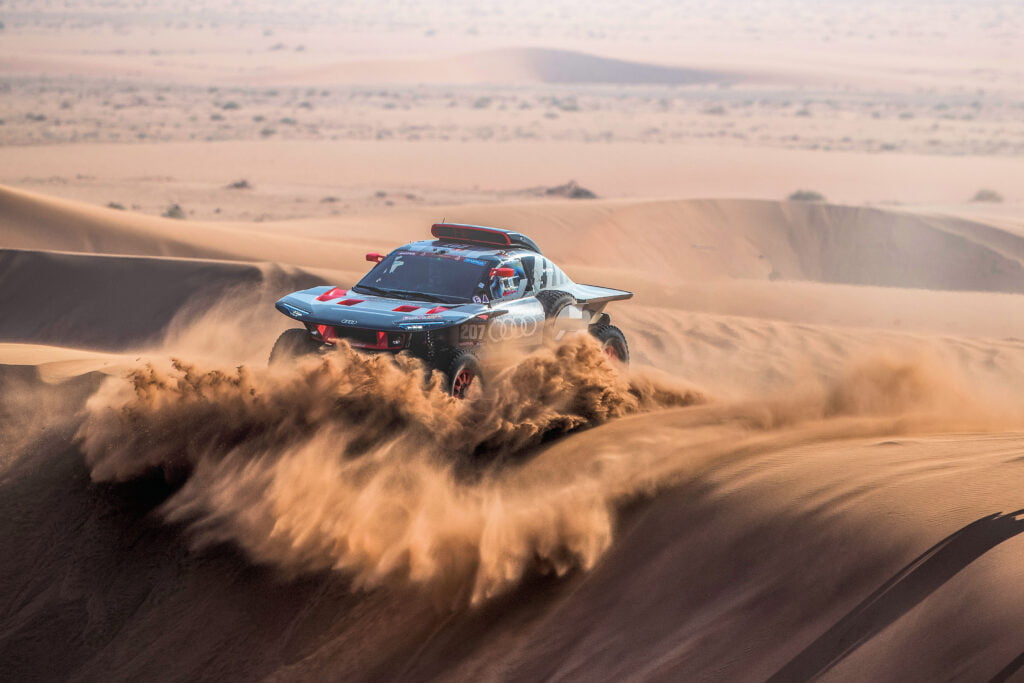
Al Rajhi started from fifth this morning, quickly working his way up the timesheets and into the lead after 100km, but settled back into a fat rhythm over the remainder of the stage hovering 49 seconds off the lead with 33km to go. His third place finish in the stage gave him the overall lead by 29 seconds from Carlos Sainz.
Al-Attiyah duly brought his Hunter home in fourth – in spite of two broken rear dampers – 28 seconds ahead of an on-form Romain Dumas/Max Delfino in their Rebellion Toyota Hilux.
Carlos Sainz/Lucas Cruz brought their Audi RS Q e-tron home in sixth after dropping as low as 16th early in the stage.
Mathieu Serradori/Loic Minaudier brought their factory Century Racing CR6-T home in a brilliant seventh while yesterday’s stage three winner, Stéphane Peterhansel/Edouard Boulanger ended eighth in their Audi as a result of opening the road.
Benediktas Vanagas/ Kuldar Sikk had the best stage of their campaign so far in their Toyota Gazoo Racing Baltics Hilux coming home in ninth and comfortably ahead of the X-Raid Arijus Mini JCW of Vaidotas Zala/Paola Fiuza.
Sebastian Loeb started second in his BRX Prodrive Hunter but plummeted down the order to 22nd.
Stage one winner Gregoire De Meuvis, was in the lead for around 150km but ground to a halt for 15 minutes at km 268, dropping 10 positions half an hour behind the leader.
Toyota Gazoo Racing’s rookie Sa’ood Variawa/Francois Cazalet jumped 20 positions ending 20th overall, while fellow TGRSA rookie Guy Botterill/Brett Cummings went from 13th to 30th after suffering three punctures, and having to stop three times to pump up the tyre.
Giniel de Villiers and Seth Quintero both had punctures within 20km and both again before km 70; Seth had a third puncture but was saved by Moraes who handed over one of his spares, but with no spare tyres left, they reverted to safe mode to complete the stage.
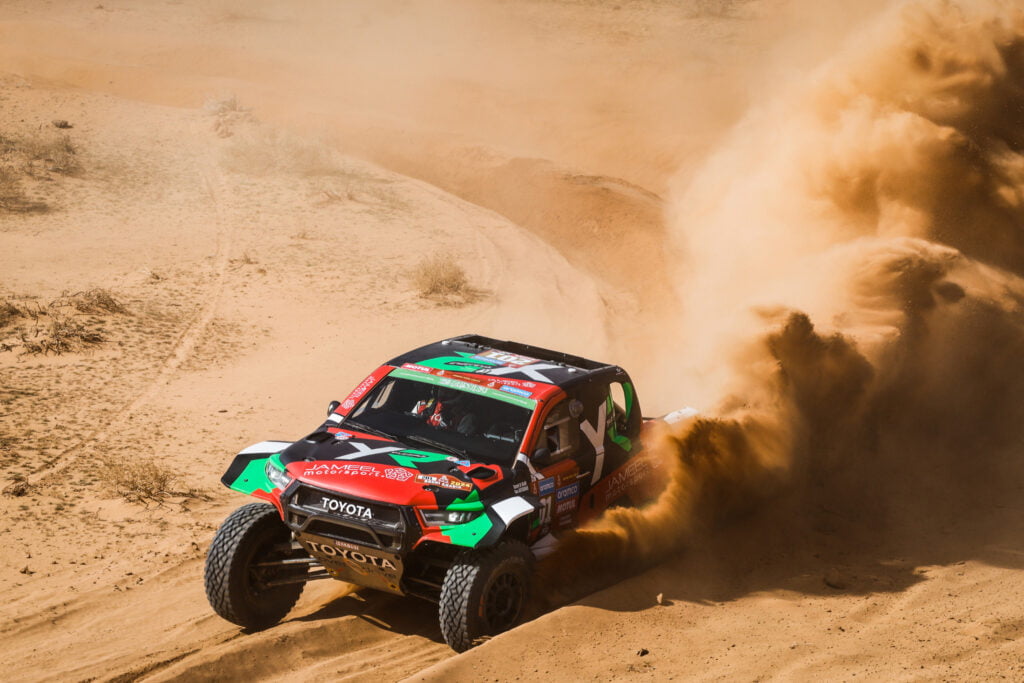
Some interesting insight was shared by Red-Lined Motorsport CEO Terence Marsh. The downloaded data shows the drivers of the three RevoT1+s changed gears an average of 7 times per km for the 463km stage (stage three) which equates to about 3 241 changes for the stage.
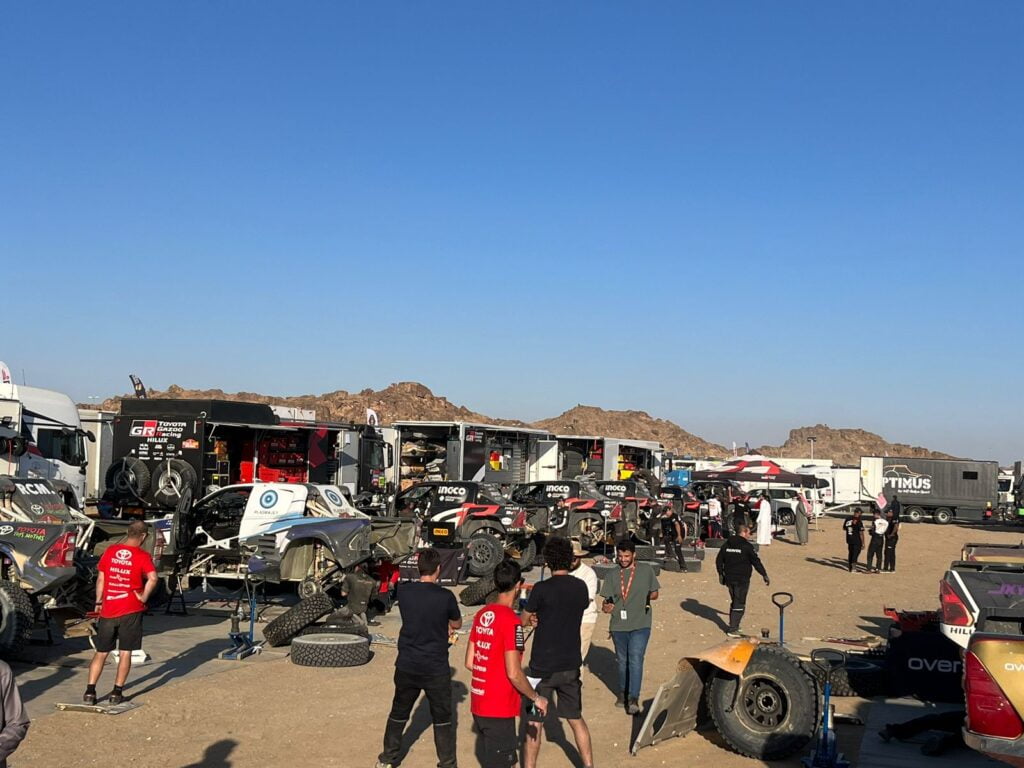
Pablo Quintanilla won the bike race to pick up a seventh stage victory on the Dakar and equal his countryman Nacho Cornejo in the Chilean roll of honour for the bike category. He finished the day’s special ahead of Joan Barreda and Kevin Benavides. Ross Branch still sits on top of the general rankings with a lead of 4’11” over Cornejo.
Sebastian Bühler crashed after 360 kilometres of the special. With the retirement of Joachim Rodrigues the day before yesterday, the Indian team is now down to just Branch and Barreda.
Sam Sunderland threw in the towel after stopping for more than 3½ hours at 11 km due to a mechanical problem.
Janus van Kasteren seemed to have another victory in sight with a lead of more than 3 minutes over Aleš Loprais after 201 km, but at the next intermediate point (after 249 km), the gap had dropped to 48’’. Worse still for the Dutchman, after 310 km, van Kasteren has lost the lead and more than 13 minutes.





